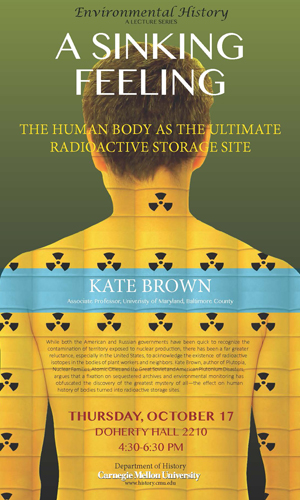Press Release: Carnegie Mellon Launches Yearlong Environmental History Lecture Series
Contact: Shilo Rea / 412-268-6094 / shilo@cmu.edu
 PITTSBURGH—Carnegie Mellon University's Department of History is launching a yearlong lecture series to celebrate the department's longtime focus on environmental history. In particular, through the illustrious career of Joel Tarr, who explores the relationship between cities, the environment and technology, the History Department has excelled for several decades in understanding how the human world impacts urban environments.
PITTSBURGH—Carnegie Mellon University's Department of History is launching a yearlong lecture series to celebrate the department's longtime focus on environmental history. In particular, through the illustrious career of Joel Tarr, who explores the relationship between cities, the environment and technology, the History Department has excelled for several decades in understanding how the human world impacts urban environments.
"People often do not think about how the environment links to city environments, and we have been fortunate to have extremely talented faculty working in this dynamic area," said Caroline Acker, head of the Department of History in the Dietrich College of Humanities and Social Sciences. "Because of recent flooding incidents and ongoing issues like climate change and global warming, the field is on the rise. More graduate students are coming to Carnegie Mellon to study environmental history, which is very encouraging because it is critical to look at the past to gain a better understanding of how we got to where we are."
Tarr, the Richard S. Caliguiri University Professor of History and Policy with additional appointments in the Heinz College and Department of Engineering and Public Policy, studies the history of the urban environment and the development of urban technological systems. Tarr has served on National Research Council committees dealing with issues of urban infrastructure, public transit, water pollution and the human dimensions of global change.
In 2008, Tarr was awarded the Society for the History of Technology's Leonardo da Vinci Medal. The society's highest honor, the medal goes to an individual who has made an outstanding contribution to the history of technology through research, teaching, publication and other activities. His edited volume "Devastation and Renewal: An Environmental History of Pittsburgh and Its Region" was awarded a Certificate of Commendation by the American Association for State and Local History.
Additionally, Associate Professor of History John Soluri, an environmental historian, joined the CMU faculty in 1999. Soluri focuses on the relationship between social and environmental change in Latin America with a particular focus on the commodification of biological organisms. His book "Banana Cultures: Agriculture, Consumption, and Environmental Change in Honduras and the United States" (2005) won the George Perkins Marsh Award for best book from the American Society for Environmental History and traces the development of the banana from Latin American cultures to kitchens in the U.S.
Kate Brown, associate professor of history at the University of Maryland, Baltimore County, will open the series with a talk on the existence of radioactive isotopes in the bodies of nuclear plant workers and nearby residents. Brown will argue that a fixation on sequestered archives and environmental monitoring has hindered a real understanding of the effect of turning human bodies into radioactive storage sites. "A Sinking Feeling: The Human Body as the Ultimate Radioactive Storage Site" will be held at 4:30 p.m., Thursday, Oct. 17 in Doherty Hall (DH) 2210.
The complete schedule of the CMU Environmental History Lecture Series:
"A Disease of Civilization? Diabetes, Race and the Changing Nature of American Health"Matthew Klingle, associate professor of history and environmental studies, Bowdoin College
Thursday, Nov. 7 at 4:30 p.m. in DH 2210
"The Bet: Paul Ehrlich, Julian Simon and Our Gamble Over Earth's Future"
Paul Sabin, associate professor of history and American Studies, Yale University
Monday, Nov. 18 at 4:30 p.m. in the University Center's Peter/McKenna/Wright Rooms
"The Lost History of the New Madrid Earthquakes"
Conevery Valencius, assistant professor of history, University of Massachusetts, Boston
Wednesday, Dec. 4 at 4:30 p.m. in Porter Hall 100
"Pollution and Politics Around Post WWII Atlanta: The Long Shadow of Underdevelopment"
Chris Sellers, associate professor of history, Stony Brook University
Friday, Feb. 28, 2014, at 4:30 p.m. (Location TBD.)
"Lending Nature a Helping Hand: New York City and the Rise of Watershed Management"
David Soll, assistant professor of history, University of Wisconsin-Eau Claire
Thursday, April 3, 2014, at 4:30 p.m. (Location TBD.)
For more information on CMU's Department of History, visit http://www.hss.cmu.edu/departments/history/.
###
Kate Brown, associate professor of history at the University of Maryland, Baltimore County, will open the lecture series with a talk on the existence of radioactive isotopes in the bodies of nuclear plant workers and nearby residents. Her talk will be at 4:30 p.m., Thursday, Oct. 17 in Doherty Hall 2210.
